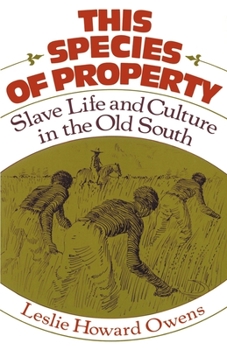This Species of Property: Slave Life and Culture in the Old South
Select Format
Select Condition 
Book Overview
Owens' fascinating study explores the personality and behavior of the slave within the context of what it meant to be a slave. Based on a variety of plantation records, diaries, slave narratives, travelers' accounts, and other items bearing on the slave's experiences in his relationships to slaveholders, it concentrates on the years between 1770 and 1865.
Format:Paperback
Language:English
ISBN:0195022459
ISBN13:9780195022452
Release Date:September 1977
Publisher:Oxford University Press
Length:304 Pages
Weight:0.60 lbs.
Dimensions:0.8" x 5.6" x 8.5"
Customer Reviews
2 ratings
THIS IS CERTAINLY ONE YOU WILL WANT TO ADD TO YOUR COLLECTION
Published by Thriftbooks.com User , 19 years ago
The author's subtitle of this book is " Slave Life and Culture in the Old South" probably does not fully bring the full impact of this particular institution, i.e. slavery, fully to the readers mind. It is difficult, for me anyway, to stay clinical and detached from this subject. This work has been meticulously researched and, despite the fact that it is a scholarly study of a facet of this countries history, the author has been able to bring, in hard hitting prose, the horror of this institution. I fully realize and accept the fact that all people, for the most part, are products of their times. We, at present, are a product of ours. Despite this, I still have a strong intellectual struggle accepting the fact that a rather large section of our population either accepted or condoned this practice. As a student of the Civil War and those times, I find it difficult to accept the fact that any understanding of the war, of that era, can be complete without a solid understand of just what slavery was, what it did to the individual and what it did to an entire society, i.e. the South. Beyond a doubt we are till reaping the crop which was planted in the early years of our country and since we have to live with the consequences it behooves each and every one of us to gain as much understanding as possible. This work, among others, sheds some light on the situation. This was beyond a doubt one of the darkest aspects of our history as a people and the author nails the essence of this perfectly. The author has used a very readable style which is quite easy to follow. The book is well organized. This book if full of tidbits and facts of which I was unaware, and very few pages were turned without new knowledge gained. The reader can be assured they will gain some insight, some understanding of the situation as it was, without feeling any obligation whatsoever to accept the situation. Recommend you read this one as a great start of the subject of slavery and recommend you add it to your collection as it makes a great reference work. Don Blankenship The Ozarks
Good overview of antebellum slave life
Published by Thriftbooks.com User , 20 years ago
Slavery is the great blight of American history, the stark contradiction of the freedoms on which the country was founded. In part because of this, the actual lives of the slaves were often misrepresented, both by contemporaries and by historians seeking to justify the "peculiar institution" or reconcile its existence. This is what Leslie Howard Owens seeks to redress with this book. Rather than focusing on the institution of slavery, Owens examines the slaves themselves, explaining how their status as bondsmen shaped the lives they led. To accomplish this, Owens sifts through numerous plantation records, slave narratives, and other often overlooked sources to reconstruct the daily lives that slaves in the United States led. The result is impressive. He demolishes the traditional "Sambo" stereotype, replacing it with a much more nuanced, complex portrait. Each chapter focuses on a different aspect of the bondsmen's experience - field work, family life, slave culture, and so forth - providing a broad portrait of what life was like for slaves. Perhaps his most fascinating findings are in his chapter on slave diet, the nutritional deficiencies of which explain many of the traditional ailments that slaves suffered from, as well as the low energy levels that many owners dismissed as laziness. While such insights make the book a valuable introduction to the subject, some of Owens's arguments are open to question. He notes that the question of resistance is one of the most debated aspects of slave life, yet his claim that historians underestimated revolutionary plotting isn't supported by the evidence. Owens also leaves the question of the mutual adjustments made by bondsmen and their owners unaddressed for the most part - a disappointing admission in what is otherwise a broad-ranging overview of the topic. Nevertheless, this is a good starting point for readers seeking to learn about slave life in the antebellum South, the echoes of which continue to resonate in America today.






